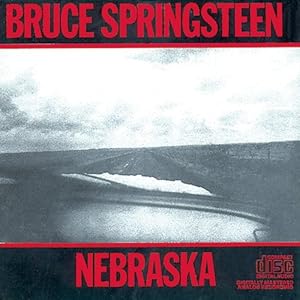Nebraska seems to be the album that non-fans think of as Springsteen's masterpiece. I often have conversations with folks who find out I'm a big Boss fan, and I hear some variation of, "I can take or leave Springsteen, but Nebraska is amazing." I think there's something about the stripped-down "folkie" sound that immediately strikes people as "authentic"
Thing about it is, I see the version of Springsteen that's put forth on this album as a valid and important part of his life as an artist. I also, however, don't see it as the the cornerstone of it. Springsteen is far too much of an entertainer, far too much of a rocker, for this to be a defining sonic representation.
However, what this stripped down approach does do is bring the songwriting, the storytelling, to the forefront. It's this Springsteen of the early 80's that became much more involved in political discourse, and documenting the lives of the less fortunate. It's much more prevalent in Born in the USA, but that album and this one are absolutely linked, not just by era, but also in intent. That's something that we'll get into next week.
Nebraska has also been called Bruce's "depression album." Not only because of the down on their luck personalities of the people in the songs, but also because of how it was recorded. Springsteen was at a point in his life where he was feeling at a personal low-point, and working on demos, alone in his home with a 4-track cassette recorder. That sense of personal desolation is pretty evident in the finished album.
The original intent was for all of these demos to be re-recorded as full E-Street Band tracks, and that would be the ultimate album. It's been confirmed by several members of the band that all of the tracks on Nebraska were, in fact, recorded by the entire band, proper. These tracks have grown to legend as "Electric Nebraska" in fan circles. They've never been released, and comments from the Springsteen camp tend to indicate they never will. The ultimate decision was that the best versions of these songs were the four-track demos that Springsteen cut by himself.
The actual Portastudio recorder is now on display in the special Springsteen exhibit at the Rock and Roll Hall of Fame and Museum in Cleveland, OH, if you have a desire to see it. Kind of amazing to stand there in front of it. The instruments on the album are limited, acoustic guitar dominates, with harmonica accents. There are other instruments on there, but relegated to the background, except for the electric guitar on "Open All Night." The ultimate effect is to serve up Springsteen's voice as the primary instrument. The lyrics hit hard because there's very little to get between you and them. The delivery is also very much steeped in Springsteen's state at the time. You can feel the desperation and longing in the voice.
However, there are reviews that peg this as a "hopeless" album, and I don't really agree with that. It is bleak, bleaker even that Darkness on the Edge of Town, but there are moments of hope and grace here. When Joe Roberts let's his brother Frankie escape the law in "Highway Patrolman," mainly because, "Man turns his back on his family he ain't no friend of mine," you do feel the grace of a man seeing that wild things need to be set free to run. Or, in "Open All Night," when our narrator sings of his headlong race across New Jersey to get back to his girl Rita, there's something uplifting, even if his "boss don't dig me, so he put me on the night shift."
Not to say it's all peaches and cream. "Atlantic City" is steeped with the sense that the favor he's doing for the guy he met isn't going to end in anything but tragedy. The title cut, sung from the point of view of real-life mass murderer Charlie Starkweather, lets you feel the ticking away of the last minutes of a doomed man. Poor "Johnny 99" is certain to pay a heavy debt to Judge "Mean" John Brown for losing his job, and dealing with it the only way he could see for himself.
Add to this longing. "Mansion on the Hill" speaks of a symbol for success and financial gain, and how that not only keeps the "have nots" outside, but also the "haves" locked inside. The sense of alienation that even "Used Cars" can represent. Or, the deep sense found in "My Father's House" that somethings can never be reclaimed or repaired once they are gone.
However, Springsteen ends the album with a song of hope, in some sense. "Reason to Believe" lets us see that, no matter how silly or odd, everyone has faith in something;
Seen a man standin' over a dead dog lyin' by the highway in a ditch
He's lookin' down kinda puzzled pokin' that dog with a stick
Got his car door flung open he's standin' out on highway 31
Like if he stood there long enough that dog'd get up and run
Struck me kinda funny seem kinda funny sir to me
Still at the end of every hard earned day people find some reason to believe
Springsteen's next step was truly, as we might hear on Monty Python, "something completely different." However, not as different as many would like to believe.

No comments:
Post a Comment